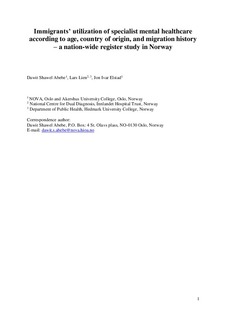| dc.contributor.author | Abebe, Dawit Shawel | |
| dc.contributor.author | Lien, Lars | |
| dc.contributor.author | Elstad, Jon Ivar | |
| dc.date.accessioned | 2018-02-27T07:08:24Z | |
| dc.date.available | 2018-02-27T07:08:24Z | |
| dc.date.created | 2017-03-27T11:51:47Z | |
| dc.date.issued | 2017 | |
| dc.identifier.citation | Social Psychiatry and Psychiatric Epidemiology. 2017, 1-9. | |
| dc.identifier.issn | 0933-7954 | |
| dc.identifier.uri | http://hdl.handle.net/11250/2487163 | |
| dc.description | This is the author’s version of the article published in Social Psychiatry and Psychiatric Epidemiology. | |
| dc.description | The article has been peer-reviewed, but does not include the publisher’s layout, page numbers and proof-corrections. | |
| dc.description | Citation for the published paper: Abebe, D. S., Lien, L., & Elstad, J. I. (2017). Immigrants’ utilization of specialist mental healthcare according to age, country of origin, and migration history: a nation-wide register study in Norway. Social Psychiatry and Psychiatric Epidemiology, 16. doi:http://dx.doi.org10.1007/s00127-017-1381-1 | |
| dc.description.abstract | Purpose As the immigrant population rises in Norway, it becomes ever more important to consider the responsiveness of health services to the specific needs of these immigrants. It has been questioned whether access to mental healthcare is adequate among all groups of immigrants. This study aims to examine the use of specialist mental healthcare services among ethnic Norwegians and specific immigrants groups. Methods Register data were used from the Norwegian Patient Registry and Statistics Norway. The sample (age 0–59) consisted of 3.3 million ethnic Norwegians and 200,000 immigrants from 11 countries. Poisson regression models were applied to examine variations in the use of specialist mental healthcare during 2008–2011 according to country of origin, age group, reason for immigration, and length of stay. Results Immigrant children and adolescents had overall significantly lower use of specialist mental healthcare than ethnic Norwegians of the same age. A distinct exception was the high utilization rate among children and youth from Iran. Among adult immigrants, utilization rates were generally lower than among ethnic Norwegians, particularly those from Poland, Somalia, Sri Lanka, and Vietnam. Adult immigrants from Iraq and Iran, however, had high utilization rates. Refugees had high utilization rates of specialist mental healthcare, while labour immigrants had low use. Conclusion Utilization rates of specialist mental healthcare are lower among immigrants than Norwegians. Immigrants from Poland, Somalia, Sri Lanka, and Vietnam, had generally quite low rates, while immigrants from Iran had high utilization rates. The findings suggest that specialist mental healthcare in Norway is underutilized among considerable parts of the immigrant population | |
| dc.language.iso | eng | |
| dc.title | Immigrants’ utilization of specialist mental healthcare according to age, country of origin, and migration history: a nation-wide register study in Norway | |
| dc.type | Peer reviewed | |
| dc.type | Journal article | |
| dc.description.version | publishedVersion | |
| dc.description.version | acceptedVersion | |
| dc.source.pagenumber | 1-9 | |
| dc.source.journal | Social Psychiatry and Psychiatric Epidemiology | |
| dc.identifier.doi | 10.1007/s00127-017-1381-1 | |
| dc.identifier.cristin | 1461349 | |
| dc.relation.project | Norges forskningsråd: 222100 | |
| cristin.unitcode | 209,98,40,6 | |
| cristin.unitname | Institutt for helsefag | |
| cristin.ispublished | true | |
| cristin.fulltext | original | |
| cristin.fulltext | postprint | |
| cristin.qualitycode | 1 | |
| dc.date.embargoenddate | 2017-04-04 | |
